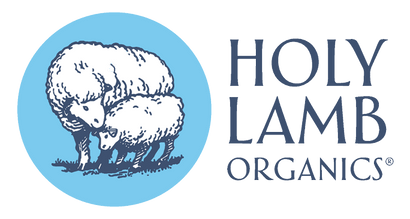Sustainability is built into our mission
Our Mission is to promote health and well-being, and to strengthen an economy based on ecology through manufacturing a line of high quality, all-natural, made in the USA organic bedding products produced using sustainable and ecological practices.
Read MoreOur Zero Waste initiavtive
We strive to be as Zero Waste and carbon neutral as possible. As part of this initiative, all of our manufacturing byproducts are reused, recycled, or composted.
The zero waste philosophy continues even after the bedding has reached the consumer. Your used natural and organic bedding items can be recycled or composted when they reach the end of their useful life.
We source from as local as possible to reduce emissions, and we’ve also upgraded our production facility’s insulation to reduce energy consumption.
Fabric and wool batting are cut efficiently to minimize remnants. Each stage of our production process has a plan for what to do with the remnant pieces.
None of our raw materials ever go into a landfill. We also reuse any materials that come to us from our supply chain.
We refrain from using plastic throughout our process. We opt for eco-friendly paper choices for our marketing tools, and ship in sturdy cardboard boxes.
so WHAT DO WE DO WITH THE WASTE?
In large scale manufacturing, there is typically more product waste because it can be very time consuming to work through all of the remnant pieces.
We believe in letting nothing go to waste. Our scraps are either repurposed for other products, donated, or available for sale on our Raw Materials Page when inventory allows.
-
Organic wool comes with a mesh backing that is saved for schools and other organizations requesting crafting materials
-
Plastic tubes are saved for donation to the Hands On Children's Museum or offered to the general public for use for free
-
Large pieces of scrap are saved to use in custom builds
-
Smaller pieces are shredded and used in shredded latex pillows
-
Plastic and cardboard tubes are saved off the bats and sent back to our wool supplier to be reused until the end of their useful lives
Plastic wrapping of latex cores is saved to re-use as plastic protection in transport
-
Paper waste is saved and used for scrap paper when possible. What little is left is shredded and used in a worm farm, or recycled.
-
Each stage of our production process has a plan for what to do with the remnant pieces.
- Larger yields might be used for crib size products
- Next, yields are used for pillows
- Even smaller yields are cut into fabric strips that are used in packaging our products
- The smallest remnants are bagged with our “pet bed scrap” which will eventually be shredded and used as an upcycled fill material in our clearance pet bed scrap.
Similar to fabric, all of our wool cuts have a next life plan
- Largest pieces are used for toppers/comforters
- Mid sized pieces are used for crib products
- We work towards our pillow wrapping wool
- Pillow fill
- Finally we end up with “scrap” wool that is used to fill our “ReKindle” products, sold as raw materials, or re-run into new wool batting
-
Similar to fabric, all of our wool cuts have a next life plan.
- Largest pieces are used for toppers/comforters
- Mid sized pieces are used for crib products
- We work towards our pillow wrapping wool
- Pillow fill
- Finally we end up with “scrap” wool that is used to fill our “ReKindle” products, sold as raw materials, or re-run into new wool batting
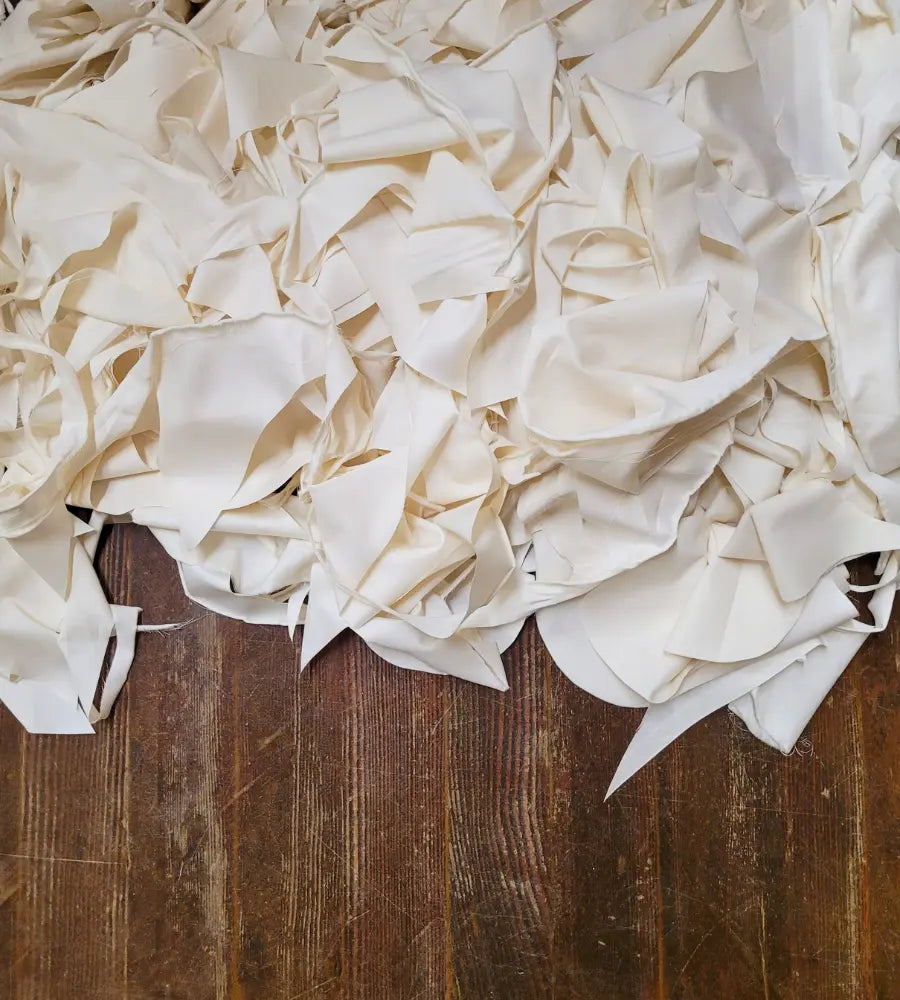
Sustainable practices in every step
How we make our natural bedding is equally as important as what we make. Every aspect of how we do business, what we make and how we make it has gone through careful consideration and conscious choice-making.
- Permaculture principles applied through every fabric of this company.
- Raw materials sourced from credible & high quality mills
- Careful consideration of all vendors we work with
- Pledged to using only natural, local materials
- Commitment to manufacturing in the USA
- Vigilant to our strive-to-be Zero Waste philosophy
- Promise to our employees: creating a outstanding work environment
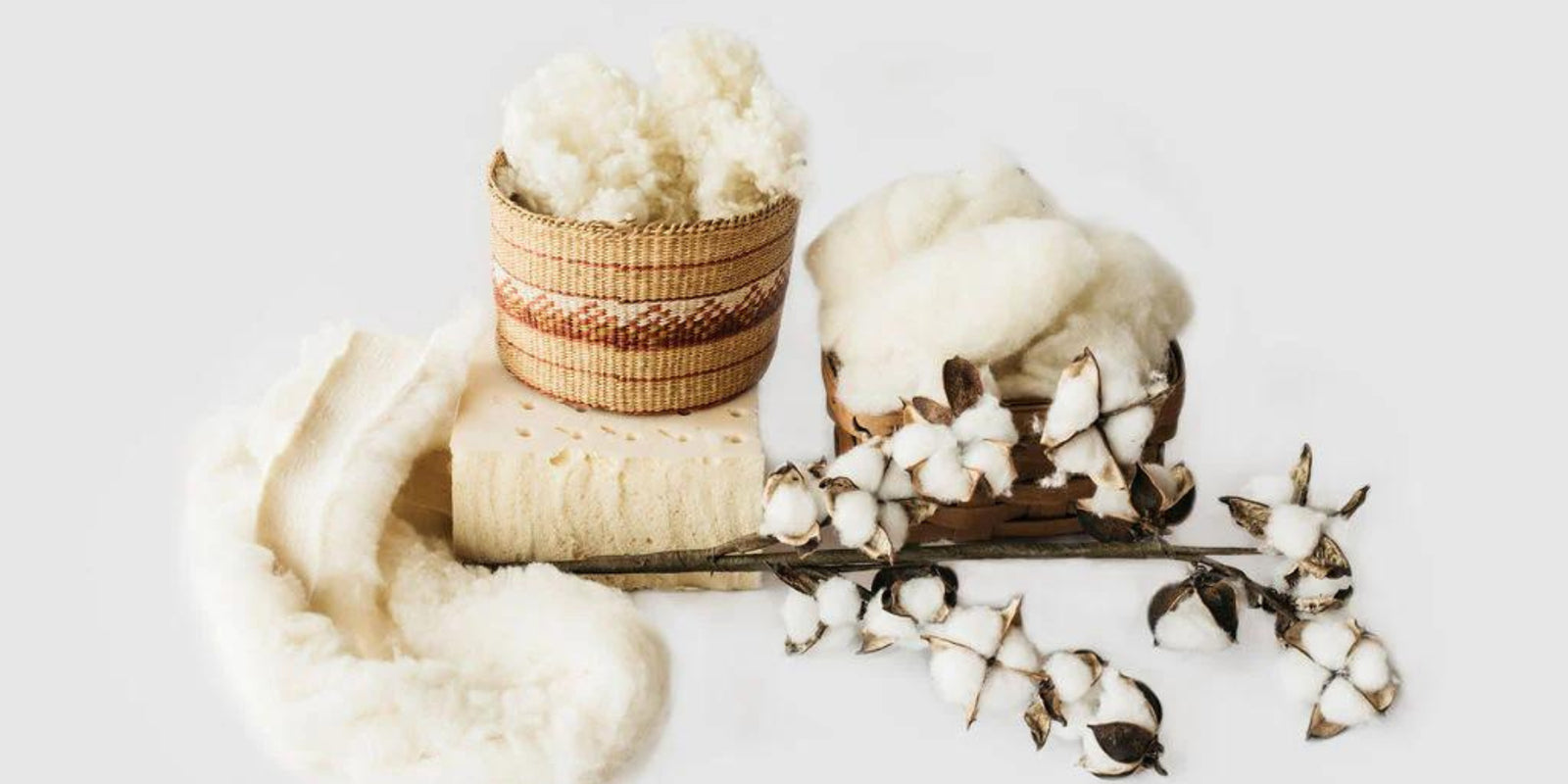
using HIGHEST QUALITY NATURAL MATERIALS
Holy Lamb Organics products are created with a “Cradle to Cradle” model, with the end of life in mind. For us, this means the materials in our products are biodegradable at the end of their useful life.
We create bedding that does no harm. You may return your bedding to the earth by recycling, composting, or re-purposing it -- doing no harm to the land, animals or people who live here.
We’re a small company that ONLY offers a line of natural bedding -- not a big company that offers a line of green bedding. We only use certified, natural materials.
We use Cotton, Wool, and Latex to build our bedding.
- Our Organic Cotton is grown in India, then milled and finished in a GOTS-certified facility in Pakistan.
- Our Premium Eco Wool is sourced from a co-op of small sheep farmers in the PNW, and our GOTS-Certified Organic Wool is sourced from New Zealand.
- The latex we use is Dunlop Latex and is sourced from Sri Lanka. Read more about our latex.
ACCOUNTABILITY AND CERTIFICATIONS
At Holy Lamb Organics, accountability is the cornerstone of our operations.
We recognize that accountability extends beyond mere compliance with regulations; it encompasses a deeper commitment to ethical practices, sustainability, and transparency.
From sourcing the finest organic materials to crafting our products with meticulous attention to detail, we hold ourselves accountable at every stage of production.
We prioritize the well-being of our customers, employees, and the environment, ensuring that every decision aligns with our core values of integrity and responsibility.
Through the strict criteria of our certifications, we strive to foster trust and accountability in every aspect of our business operations.
Learn More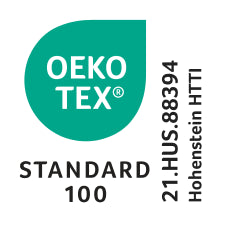
Our OEKO-TEX® STANDARD 100 certification guarantees the purity and safety of our products using thorough laboratory testing of every material used in our OEKO-TEX® certified products.
These products are then regularly lab-tested to verify that no change has been made and that the product is indeed chemical-free.
Learn more about what our OEKO-TEX® STANDARD 100 means to us.
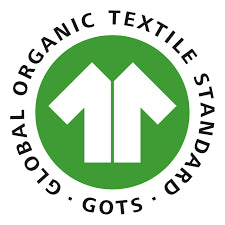
Global Organic Textile Standard (GOTS) is a globally recognized certification whose environmental and social standards apply to every step of the supply chain, right down to the sheep and cotton farms!
GOTS ensuring that every step of our production process meets the highest organic standards, and guarantees fair labor practices throughout.
Read more about it in Our GOTS Story.
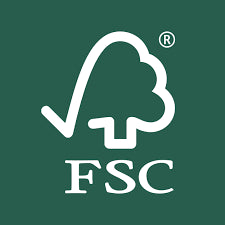
The Forest Stewardship Council (FSC) is an independent nonprofit organization that sets standards under which forests and companies are certified.
Their criteria consists of three equally weighted areas: environmental, economic, and social. The FSC's mission is to promote environmentally sound, socially beneficial and economically prosperous management of the world's forests.
Our Eco-Friendly packaging pledge
Packaging is often one of the main areas in a business where waste harmful to the Earth abounds. With packaging peanuts, plastic wrap, or plastic bags usually being the most cost-effective option, most businesses opt for this instead of spending a little more to minimize their plastic pollution.
We choose to ship our products using as little waste as possible to minimize our impact on the Earth.
We do this by packing your items in a cardboard box with no other packaging materials unless requested. Our customers always have the option of adding a compostable Bio Bag at checkout, for extra protection against moisture or potential tears in the boxes during shipping.
When ordering materials for a product-based business such as ours, they can often arrive with unwanted plastics.
Though we thoroughly vet our supply chains and only order sustainable materials, some materials just need extra layers during the shipping process to protect from tears and stains. Though compostable and recyclable options are out there, a lot of manufacturers simply cannot afford to make the switch.
So, we make sure to give any plastic packaging materials that come into our warehouse a new life. For larger items such as mattresses, we may add some extra protection in the form of upcycled plastic from our supply chain. By upcycling these materials, we can avoid sending them to the landfill.
HOW CAN I UPCYCLE OR RECYCLE THE PLASTICS IN PACKAGING?
With any upcycled plastics that you receive in your package, we encourage you to continue upcycling the material, or to recycle it at your nearest facility.
CLICK HERE TO FIND A RECYCLING DROP OFF NEAR YOU
Here are some ideas for upcycling uses:
- Wrap your paintbrushes to keep them from drying out between uses
- Extend the life of your fresh bouquet by wrapping the stems in a damp paper towel, then the plastic wrap.
- Wrap the stems of your bananas to keep them from browning too fast.
- Avoid shampoo, conditioner and body wash spills while travelling with a piece of plastic wrap. Remove the lids or caps, place a piece of plastic wrap over the top of the bottle, then secure the lids back into place.
- Remove jar & bottle labels easily by wrapping it with a damp paper towel and some plastic until residue softens.
What is upcycling vs recycling?
Upcycling is a great option for minimizing waste.
Materials or items that were originally landfill-bound get to be re-purposed in a creative way, and their lifespans are, therefore, lengthened. This gives the material more meaning and use than it would have as a single-use plastic (or other material).
Recycling, on the other hand, involves breaking down the waste in order to create something new, whereas upcycling utilizes it in its current state.
Because of this, Upcycling is often regarded as more environmentally friendly than recycling. It uses fewer resources, water, and energy, and is less expensive.
What's more, many materials can't be recycled at all or have very limited options. Upcycling gives those materials a chance to be reused that they otherwise would not have gotten.
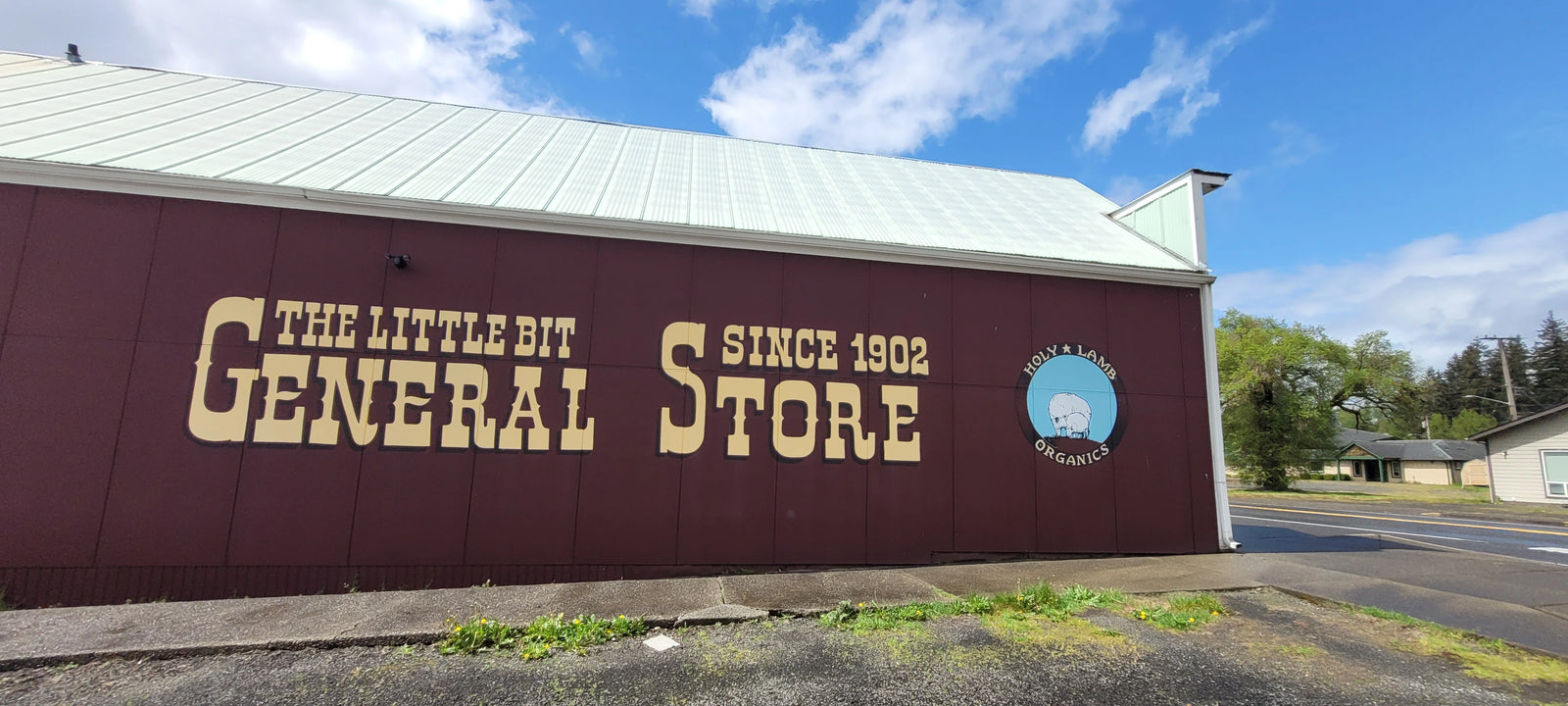
Green Building Practices
We use natural building products, FSC lumber, and salvaged building materials for renovations to our manufacturing facility.
- In 2009, our building was insulated for the first time, and it was built in 1902!
- We chose a green insulation product called Aircrete for insulating the walls instead of fiberglass. It’s made of natural materials so benign you can eat it!
- In 2018, the decision was made to replace the windows in the Little Bit, the main energy offender. This greatly reduced our energy consumption.
- Salvaged building materials are purchased from local reused building materials stores in our community.
- Sustainably harvested lumber is sourced locally, particularly from a leading forest steward Wild Thyme Farm an FSC™ (a certified sustainable permaculture tree farm with a 150 acre immaculate forest).
- Installed energy efficient LED bulbs for lighting in all of our facilities.
We have many policies at our facilities to help us reduce our environmental impact in our facilities, including:
-
- Turning off lights to conserve energy
- Scheduled sleep and screen saver modes for devices
- Energy efficient light bulbs
- Lowered room temperatures
-
- We recycle and compost at all of our facilities
- We only use chemical-free, natural products in our workspaces, from the trash bags to toilet paper!
- Employees use glassware & cloth napkins to eliminate waste
- Eliminate unnecessary printing and copying to reduce paper use
- Use sustainable options for what paper we do use
- Avoid using any plastics in marketing materials
- Offer ‘mattress haul away’ in which they are recycled and thus removed from landfill
- Package items minimally, using only cardboard, paper tape, and a biodegradable bag when requested.
oUR sUSTAINABLE VALUES AND ETHICAL STANDARDS
Holy Lamb Organics is a woman & veteran-owned small business that strives to provide natural, sustainable, handmade products for every customer and superior friendly customer service.
We are transparent with our customers about our materials, production and supply chain, and offer personalized support through every step.
Our value-based business foundation is rooted in sustainable choices for everyone involved. We've considered each step in our manufacturing process and have minimized our eco footprint right from the start.
In business since 2000, our eco footprint is actually still shrinking. Why? We’re continually measuring and striving to make it smaller by applying Permaculture principles to everything we do.
